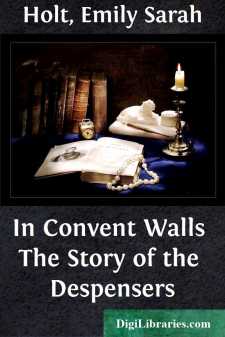Categories
- Antiques & Collectibles 13
- Architecture 36
- Art 48
- Bibles 22
- Biography & Autobiography 813
- Body, Mind & Spirit 142
- Business & Economics 28
- Children's Books 17
- Children's Fiction 14
- Computers 4
- Cooking 94
- Crafts & Hobbies 4
- Drama 346
- Education 46
- Family & Relationships 57
- Fiction 11829
- Games 19
- Gardening 17
- Health & Fitness 34
- History 1377
- House & Home 1
- Humor 147
- Juvenile Fiction 1873
- Juvenile Nonfiction 202
- Language Arts & Disciplines 88
- Law 16
- Literary Collections 686
- Literary Criticism 179
- Mathematics 13
- Medical 41
- Music 40
- Nature 179
- Non-Classifiable 1768
- Performing Arts 7
- Periodicals 1453
- Philosophy 64
- Photography 2
- Poetry 896
- Political Science 203
- Psychology 42
- Reference 154
- Religion 513
- Science 126
- Self-Help 84
- Social Science 81
- Sports & Recreation 34
- Study Aids 3
- Technology & Engineering 59
- Transportation 23
- Travel 463
- True Crime 29
In Convent Walls The Story of the Despensers
by: Emily Sarah Holt
Categories:
Description:
Excerpt
Preface.
The historical portion of this tale has been partially narrated in one of my previous volumes, “In All Time of our Tribulation,” in which the Despenser story is begun, and its end told from another point of view. That volume left Isabelle of France at the height of her ambition, in the place to reach which she had been plotting so long and so unscrupulously. Here we see the Nemesis come upon her and the chief partner of her guilt; the proof that there is a God that judgeth in the earth. It is surely one of the saddest stories of history—sad as all stories are which tell of men and women whom God has endowed richly with gifts, and who, casting from them the Divine hand which would fain lift them up into the light of the Golden City, deliberately choose the pathway of death, and the blackness of darkness for ever. Few women have had grander opportunities given them than Isabelle for serving God and making their names blessed and immortal. She chose rather to serve self: and thereby inscribed her name on one of the blackest pages of England’s history, and handed down her memory to eternal execration. For “life is to do the will of God”—the true blessedness and glory of life here, no less than the life hereafter.
“Oh, the bitter shame and sorrow,
That a time should ever be
When I let the Saviour’s pity
Plead in vain, and proudly answered—
‘All of self, and none of Thee!’
“Yet He found me; I beheld Him
Bleeding on the accursed tree,—
Heard Him pray, ‘Forgive them, Father!’
And my wistful heart said faintly,
‘Some of self, and some of Thee!’
“Day by day, His tender mercy,
Healing, helping, full and free,
Sweet and strong, and, ah! so patient,
Brought me lower, while I whispered,
‘Less of self, and more of Thee!’
“Higher than the highest heaven,
Deeper than the deepest sea,
Lord, Thy love at last hast conquered:
Grant me now my heart’s desire—
‘None of self, and all of Thee!’”
Wherein Dame Cicely de Chaucombe scribeth soothliness (1360).
Wherein Commence the Annals of Cicely.
“Heaven does with us, as we with torches do—
Not light them for themselves.”
Shakespeare.
“It is of no use, Jack,” quoth I. “I never did love her, I never can, and never shall.”
“And I never bade you, Sissot,” answered he. “Put that in belike, prithee.”
“But you bade me write the story out,” said I. “Ay, I did so. But I left you free to speak your mind of any body that should come therein, from a bishop to a baa-lamb,” said he.
“Where shall I go for mine ink?” I made answer: “seeing that some part of my tale, to correspond to the matter, should need to be writ in vernage, (Note 1) and some other in verjuice.”
“Keep two quills by you,” saith he, “with inkhorns of the twain, and use either according to the matter.”
“Ay me!” said I. “It should be the strangest and woefullest tale ever writ by woman.”
“The more need that it should be writ,” quoth Jack, “by them that have lived it, and can tell the sooth-fastness (truth) thereof....












